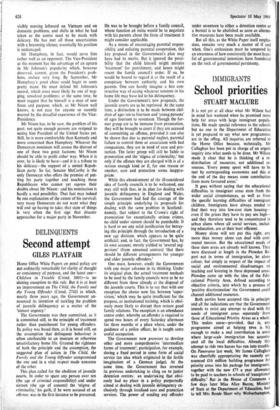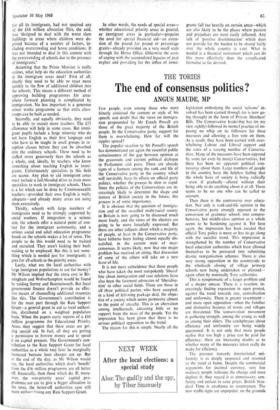School priorities
IMMIGRANTS STUART MACLURE
It is not yet at all clear what Mr Wilson had in mind last weekend when he promised more help for areas with large immigrant popula- tions. He made special reference to the schools but no one in the Department of Education is yet prepared to say what new programmes are in the offing. All inquiries are referred to the Home Office because, technically, Mr Callaghan has been put in charge of an urgent inquiry into what needs to be done. Mr Wilson made it clear that he is thinking of a re- distribution of resources, not additional re- sources. 'Every penny spent will have to be met by corresponding economies and this at the end of the day means some contribution from more favoured areas.' It is not yet at all clear what Mr Wilson had in mind last weekend when he promised more help for areas with large immigrant popula- tions. He made special reference to the schools but no one in the Department of Education is yet prepared to say what new programmes are in the offing. All inquiries are referred to the Home Office because, technically, Mr Callaghan has been put in charge of an urgent inquiry into what needs to be done. Mr Wilson made it clear that he is thinking of a re- distribution of resources, not additional re- sources. 'Every penny spent will have to be met by corresponding economies and this at the end of the day means some contribution from more favoured areas.'
it goes without saying that the educational difficulties in immigrant areas stem from the wider social circumstances, as well as from the specific learning difficulties of immigrant children. Immigrants have always tended to find their way into low-cost slum housing— even if the prices they have to pay are high— and they therefore tend to be concentrated in urban slums where all social -services, includ- ing education, are at their least efficient.
Money alone will not put this right, any more than money alone can deal with com- munal tension. But the educational needs of these slum areas are already well known. They were discussed at length in the Plowden Re- port not in terms of immigration, let alone colour, but simply in respect of the impact of social and environmental disadvantages on teaching and learning in these depressed areas. Plowden came up with the idea of the Edu- cational Priority Area, defined according to objective criteria, into which by a process of 'positive discrimination' the Government could channel additional resources.
Both parties have accepted this in principle and all the indications are that the Government intends to resist any attempt to deal with the needs of immigrant areas separately from those of Educational Priority Areas as a whole. This makes sense—provided, that is, any programme aimed at helping E..PAs is big enough to make a real contribution in areas where large-scale immigration has accentu- ated all the local difficulties. Already this attempt to ride two horses has run into trouble. On Panorama last week, Mr James Callaghan was cheerfully appropriating the recently an- nounced f16 million building programme for priority areas into his package for immigrants. together with the new £75 a year allowance to be paid to teachers in schools of 'exceptional difficulty.' But in the House of Commons a few days later Miss Alice Bacon, Minister of State at the Department of Education, had to tell Mrs Renee Short why Wolverhampton, for all its immigrants, had not received any of the f16 million allocation This, she said, was 'designed to deal with the worst slum buildings in areas where children were de- prived because of a number of factors, in- cluding overcrowding and home conditions. It was not intended to deal in this context with the overcrowding of schools due to the presence of immigrants.'
Assuming that the Prime Minister is really serious, what help do the education authorities in the immigrant areas need? First of all, clearly they need to be able to react more quickly to the flow of additional children into the schools. This means a different method of approving building programmes for areas where forward planning is complicated by immigration. No less important is a generous minor works programme so that extra class- rooms can be built as needed.
Secondly, and equally obviously, they need to be able to recruit more teachers. The 05 allowance will help in some cases. But immi- grant pupils include a large minority who do not have English as their first language and who have to be taught in small groups in re- ception classes before they can be absorbed into the ordinary schools. These need to be staffed more generously than the schools as a whole, and, ideally, by teachers who know something about teaching English to immi- grants. Unfortunately specialists in this field are scarce. Any plan to aid immigrant areas must include a full-blooded drive to train more specialists to work in immigrant schools. There is a lot which can be done by Commonwealth teachers—provided their own English is really adequate—and already many areas are using them extensively.
Thirdly, schools with large numbers of immigrants need to be strongly supported by social workers. If integration is a serious aim, the schools offer a natural point of con- tact for the immigrant community, and a serious social and adult education programme based on the schools makes a lot of sense. The people to do this would need to be trained and recruited. They aren't kicking their heels waiting to be employed. But this is not some- thing which is needed just for immigrants; it goes for all schools in the priority areas.
Lastly, what are the local authorities with large immigrant populations to use for money? Mr Wilson implied that the extra cost in Bir- mingham and Wolverhampton would be found by raiding Surrey and Bournemouth. But local government finance doesn't provide an effec- tive means of channelling additional resources like this. The Government's contribution is for the most part through the Rate Support Grant—a general grant in aid to local authori- ties, distributed on a weighted population basis. When the papers carry reports of a £16 million programme •for Educational Priority Areas they suggest that these areas are get- ting special aid. In fact, all they are getting is permistion to borrow money and to spend it on capital projects. The Government's con- tribution to the Rate Support Grant for local authorities as a whole may later be marginally increased because loan charges are up. But at the end of the day, as Mr Wilson would say, the local authorities which don't 'benefit' from the L16 million programme are all better off, financially, than those which do. If, more- over, the non-priority areas' capital pro- grammes- are cut to give a bigger allocation to the EPAS, the better-off authorities save still more without iusing any Rate Support Grant.
In other words, the needs of special areas— whether educational priority areas in general, or immigrant areas in particular—pinpoint the need for special financial aid—an exten- sion of the pound for pound or percentage grants—already provided on a very small scale through the Home Office. Otherwise the costs of coping with the accumulated legacies of past neglect and providing for the influx of immi- grants fall too heavily on certain areas—which are also likely to be the places where passion and prejudices are most easily inflamed. Any talk of 'positive discrimination' which does not provide for the burden to be shared fairly over the whole country is cant. What is needed is a financial instrument which can do this more effectively than the complicated formulae so far devised.







































 Previous page
Previous page